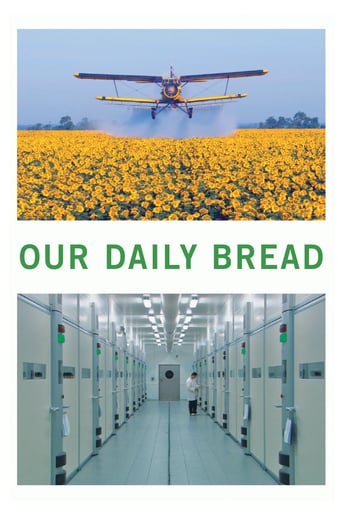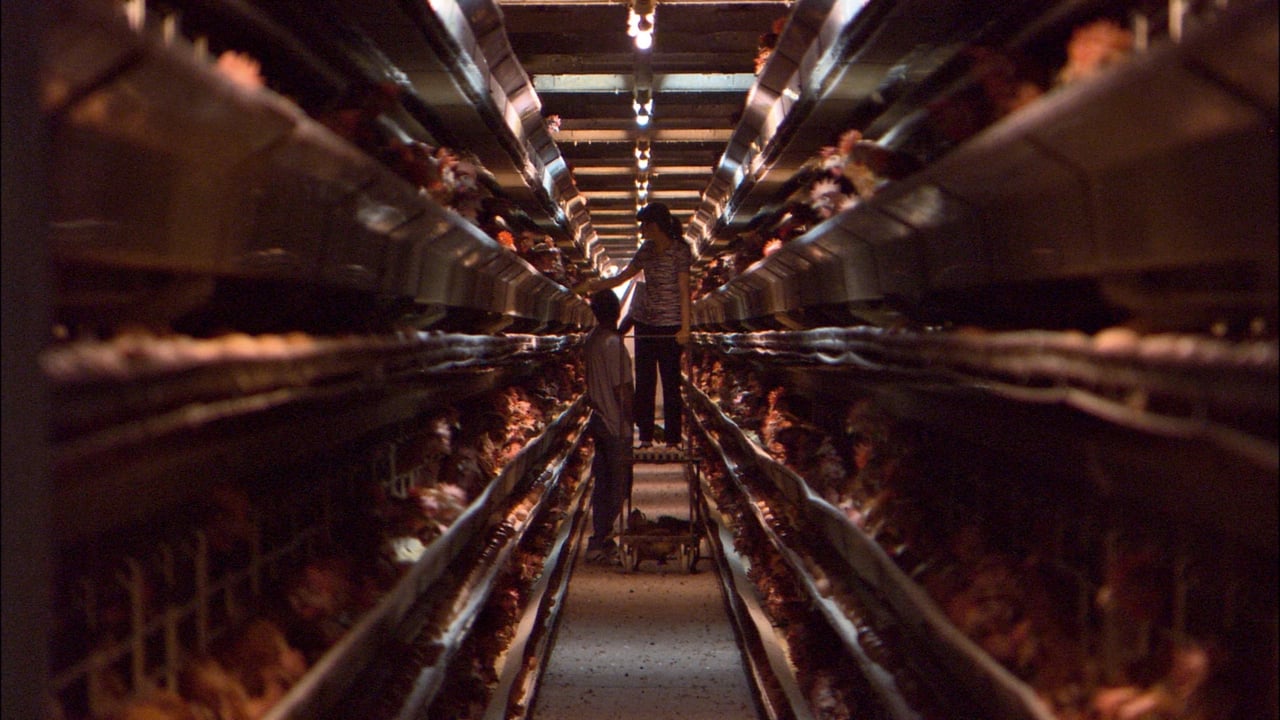Horst in Translation (filmreviews@web.de)
"Our Daily Bread" is an Austrian documentary movie from 10 years ago. The director is Nikolaus Geyrhalter and he also came up with the script together with Wolfgang Widerhofer. Both are truly prolific filmmakers and also worked together on other projects such as "Abendland". Their work here can actually be summarized pretty quickly. It is basically a making-of documentary of the food industry. There are parts about plants included and how they are processed, but the really crucial part here are the segments about cattle, which includes cows, chicken and pigs.If you are interested in watching this, you probably have heard about "Earthlings", the American documentary that came out the very same year. There are some parallels, but there are also differences. One crucial differences is for example that Geyrhalter only included static camera shots here and also only recordings that he made himself. But the biggest difference is probably that there is no narration in this movie here. There are also no dialogs. Well.. there is some talking, but it's really irrelevant and adds nothing to the film in the sense of people being recorded during breakfast (eating meat). And there are no interviews in here. It is almost a silent movie and that is certainly not something for everybody, even if they are interested in the topic. All this is actually a reason why this documentary is so well-known, also outside German-speaking regions. You can easily watch this without being able to speak a single word German. But be ready to see some heartbreaking action if you feel with animals.I personally am a vegetarian and if I wasn't one already, I'd probably be one after watching this movie. I also wonder how people are able to work in professions such as the ones depicted in here. The entire cast list are people who work on crop fields or slaughterhouses. They must not only do not be religious at all, but also perceive these creatures as things in order to be able to deal with what they are doing on a daily basis. I could never do that. Thank God I don't have to. Excellent documentary. One of the best of the year.
magnuslhad
On a mission to show us things we do not normally see, Our Daily Bread is a meditative, at times darkly poetic look at industrial food production. The film eschews narration, commentary, titles and critical reflection by participants. It does not quite go so far as to say 'make up your own mind', as the narrative is constructed very deliberately by camera placement, framing, and editing. Very often, we are riding in the cockpit of the combine harvesters and crop sprayers - the film constantly reminds us that we are not standing outside, but very much part of the machine. But the film is less finger-wagging than a conversation starter. Some people will never touch another sausage again. Others will see the bland inevitability of mechanised solutions to feeding an over-populated planet. The abattoir scenes work well, conveying a strange other-worldliness, neither humanising nor demonising the lives before us, be they human or animal. The crop tending scenes and harvesting work less well. A 70-second shot of a yellow field of indeterminable plants suddenly dusted by a plane is an example of lugubrious shot flow that severely tests the patience. The film is relentless in establishing its detachment, its candour, and its anti-documentary credentials with regard to the subject, but ironically ends up proving itself somewhat smug and bourgeois in its rigidity. Nice camera-work, but a misfiring storytelling process.
Dennis Littrell
I noticed that some of the reviewers of this documentary film lauded the humane and mercifully quick way the cows, pigs, and chickens were killed. Nonetheless the image of the shudder of the cows after the lethal stun gun is pressed to their foreheads lingers horrifically.Some reviewers thought film was funny. And there is a thread at IMDb that asks which part of the film did you find the most disgusting.I also note that the accolades handed out for what might be called German efficiency in the way agribusiness is able to streamline the production process from conception to the trucks headed for the autobahn. Yet I found it rather disgusting to see a long, bloody slit on the side of a cow, a man's bloody hands reaching in and pulling out a new born calf in a kind of Caesarian section for the hoofed set. I presume the cow was anesthetized but somehow remained standing.And I realize that without these amazing innovations in animal husbandry and slaughtering techniques most people even in Europe and America would find the price of meat a bit of a strain on their budgets.I think what is bothering me is what Sir Martin Rees in another context referred to as "the yuck factor." I think it was in reference to human cloning. At any rate all the chickens, pigs and cows seen being nicely euthanized, bleed, skinned, butchered and sent to market, are increasingly cookie-cuttered so that they are not far from being clones themselves. (Maybe some of them are.) At any rate being clones would make it all the easier for the carcasses to fit conveniently into the apparatuses designed for what might be called an efficient disassembly line.One more thing about the animals: what they are is what we are: slabs of meat. There is no escape from that conclusion is part of the message of this extraordinary film which is without dialogue, without voice-over, without narration. Director Nikolaus Geyrhalter instead gives us long visual takes and background sounds on what most of us have never seen before: industrial agriculture as it is practiced in the Western world today.Okay, now to the food that grows in the soil or just in water and beds of plastic foam. We see vast greenhouses where yellow peppers and red tomatoes thrive as they grow toward the light on vertical poles and strings, and where bored persons tread the aisles picking the ripe vegetables and putting them into boxes.I cannot find fault with such enterprises; there is no yuck factor to experience. Geyrhalter holds the camera on the aisles and on the fields where grain, potatoes and other foods are harvested with machines of steel driven by men with computers at their sides in air conditioned cabs. The camera lingers to emphasize the vastness of the venture, and then we see the workers at their lunch as though unaware that they are being filmed. We note that they eat, and are reminded that eating is what this film is all about.In Vedanta it is said that we humans occupy a realm that can be called "the food sheath" where we are both the eater and the eaten.No, this grandiose efficiency does not offend somehow. What I don't like about it is how such monocultures require pesticides, weed killers and artificial fertilizers. I especially don't like the hormones and antibiotics fed to the animals. Again, however, without such artificialities we could not feed a world with seven billion souls.Which brings me to my point: it doesn't have to be this way. If we had fewer human beings on the planet (say less than a billion) and encouraged a significant number of them to go into sustainable, truly humane and natural farming, we would not have to have industrial agriculture. And I want to add that something like one-third of the people on this planet live in poverty. There are many reasons for this, and there is hope that those numbers will decline as wealth becomes more equitably distributed. So many people living in poverty cheapens humanity. If we had fewer people on the planet relative to the planet's riches, each individual would be more valuable and less subject to manipulation by the powers that be. The worth of humanity on a per capita basis would increase. With billions living in poverty, humans are simply worth less and can be made very nearly expendable by those with the power and money.See this powerful film at your own risk. Vegans will love it but be unable to watch it. Carnivores may lick their chops, and most people will sit before the screen as I was, spellbound.
Spuzzlightyear
I'm always a sucker for films that try to emulate Baraka or Koyaanisqatsi. Non narrative films that let the images speak for themselves. A lot of films try and fail. Sometimes the images are too boring, sometimes it's too repetitive. 'Our Daily Bread' just about nearly gets it right by exploring how the food on our table comes to be. By going all over the world, and exploring all sorts of food, the filmmakers cover a spectacular realm of food, animals, and people for the documentary. Much is spectacular. What I found, and maybe I'm just a sicko, who knows, but I found the segments regarding how animals are processed to be the most fascinating. They almost completely copied the chick harvesting from Baraka (and who could blame them!) to the, I'm sorry, totally cool way they kill pigs nowadays. FUN FOR EVERYONE! Ha ha! I loved it!


 AD
AD

